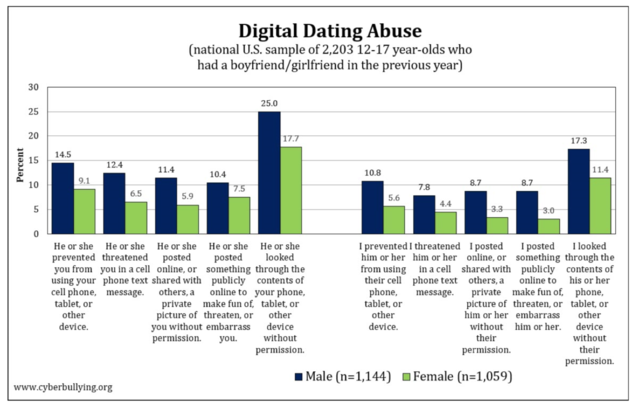Here’s a story that just might break your heart, as it did mine. “Evan” and “Rachel” (whose names have been changed) are 8th graders who had been “dating” for a couple of weeks. Mind you, these days “dating” in middle school mostly involves texting, Snapchatting, and other online interactions. In this case, Evan and Rachel also shared their passwords with each other. Unfortunately this is not an uncommon practice between young adolescent “couples” and even between friends. After just three weeks, Rachel decided to call it quits on their relationship. Feeling aggrieved, Evan used her passwords to log into her accounts where he began posting and texting on her behalf. Really embarrassing stuff. He even shared photos that she absolutely did not want others to see. Needless to say, shame, hurt, and a lot of tears ensued.
Young love has always been fraught with heartbreak. But today, this heartbreak is sometimes also shared online where it becomes visible to many others, sometimes even to strangers. It also means it is permanently recorded. In other words, reminders of this heartbreak can live long after the breakup occurs and opportunities to inflict further pain are only a few taps on the cellphone away.
Whether he knew it or not, what Evan did to Rachel following their breakup has a name, it’s called “Digital Dating Violence.”
First-Ever Digital Dating Violence Study
Sameer Hinduja and Justin W. Patchin of the Cyberbullying Research Center just released the first study to examine this phenomenon. In a Journal of Interpersonal Violence article titled “Digital Dating Abuse Among a National Sample of U.S. Youth,” they describe digital dating abuse as “physical, sexual, or psychological/emotional violence that occurs between romantic partners through the use of texting, social media, and related online mediums.” Their data, collected from a nationally representative sample of 2,218 American middle and high school students (12-17 years of age), reveals that over one quarter (28.1%) of youth who have been in a romantic relationship during the previous year say they’d been the victim of digital dating abuse.
I suppose this shouldn’t surprise anybody. After all, young people spend an awful lot of time on their phones. Who knows what goes on there? Most adults certainly don’t. Just consider the range of online activities that digital dating abuse can include:
- Examining the content of another’s device without permission
- Keeping another person from using their device
- Threatening another online
- Posting embarrassing content
- Sharing private images without permission
The study also reveals, surprisingly, that “(m)ales were significantly more likely to have experienced digital dating abuse (32.3%) compared to females (23.6%), and more likely to experience all types of digital dating abuse, and were even more likely to experience physical aggression.” Additionally, according to the study, 81% of students who had been the target of digital dating abuse had also been the target of offline dating abuse (which can include pushing, shoving, physical threats, etc.).
Much has been made of the fact that the percentage of U.S. teens and young adults reporting mental distress, depression, suicidal thoughts and actions has risen significantly over the past decade. Digital dating abuse could be one of many factors contributing to this rise. Hinduja and Patchin’s study finds that students “who reported depressive symptoms were about four times as likely to have experienced digital dating abuse.” Interestingly, those who had been the target of cyberbullying were more likely to have been the target of digital dating abuse too.

Digital Dating Abuse
Source: Cyberbullying Research Center
It’s Teen Dating Violence Awareness and Prevention Month
As we observe Teen Dating Violence Awareness and Prevention Month, it is imperative for parents and teachers to remember that today, lots of “dating” activity happens online and away from our eyes, our awareness, and without our guidance. How in the world do we prepare kids to withstand the inevitable heartbreak that comes with young love, when its possible aftermath happens in an environment we do not frequent?
Considering the amount of time teens spend online coupled with the amount of time they spend pursuing relationships with one another, it is beyond ridiculous that we don’t better equip youth for a digital world where the stakes, and opportunities for heartbreak, are so high. It is a rare school that takes the time to teach kids how to deal with all the intricacies of online life, like cyberbullying, sexting, hate speech… let alone digital dating abuse, even though, according to Hinduja and Patchin:
article continues after advertisement
… research has found that certain educational programs can help change belief systems around dating violence by reducing rape myth and gender violence acceptance, emboldening bystanders to provide support to friends, and teaching youth how to stay safe in romantic relationships.